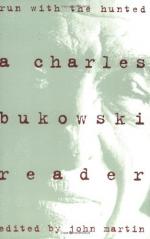|
This section contains 1,808 words (approx. 7 pages at 300 words per page) |

|
SOURCE: "Charles Bukowski and the Avante-Garde," in Review of Contemporary Fiction, Vol. 5, No. 3, Fall 1985, pp. 56-59.
In the following review, Smith discusses the humor in Bukowski's short stories.
What is the avant-garde? A cultural elite, making Advanced or High Art, but it is also a tradition of the untraditional. Precedents exist for virtually every avant-garde eccentricity or innovation. As Roland Barthes puts it, "The avant-garde is never anything but the progressive, emancipated form of past culture." While it may become politicized (during the Vietnam War, even "the gloriously impertinent Bukowski" was temporarily radicalized), it is typically individualist, antiformal, anarchistic. Bohemian life-styles, épater les bourgeois, the alienation (psychological, ethical, economic) of the artist from society: Bukowski's writing echoes all these attitudes.
Bukowski's opposition to the status quo is signaled by his language. The tough-drunk persona created in the writing is intimately linked to the way in which his fictions...
|
This section contains 1,808 words (approx. 7 pages at 300 words per page) |

|


